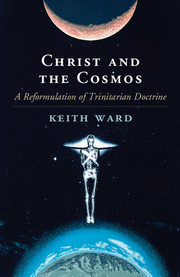Book contents
- Frontmatter
- Contents
- Preface
- Acknowledgements
- PART I THE THREEFOLD NATURE OF THE DIVINE BEING
- PART II THE BIBLICAL SOURCES OF TRINITARIAN THOUGHT
- PART III THE TRINITY, IMMANENT AND ECONOMIC
- PART IV THE SOCIAL TRINITY
- 22 Persons and Substances
- 23 The Idea of a Personal and Free Creation
- 24 The Logical Uniqueness of Persons
- 25 The Divine Nature and Freedom
- 26 Freedom in God and in Creatures
- 27 Persons as Necessarily Relational
- 28 An Ontology of the Personal?
- 29 Intra-Trinitarian Love
- 30 Infinite Gods
- 31 Divine Love and Necessity
- 32 Love and Alterity
- 33 Trinity versus Monotheism
- 34 The Passion of Christ
- 35 God and Abandonment
- PART V THE COSMIC TRINITY
- Bibliography
- Subject Index
- Name Index
28 - An Ontology of the Personal?
from PART IV - THE SOCIAL TRINITY
Published online by Cambridge University Press: 05 September 2015
- Frontmatter
- Contents
- Preface
- Acknowledgements
- PART I THE THREEFOLD NATURE OF THE DIVINE BEING
- PART II THE BIBLICAL SOURCES OF TRINITARIAN THOUGHT
- PART III THE TRINITY, IMMANENT AND ECONOMIC
- PART IV THE SOCIAL TRINITY
- 22 Persons and Substances
- 23 The Idea of a Personal and Free Creation
- 24 The Logical Uniqueness of Persons
- 25 The Divine Nature and Freedom
- 26 Freedom in God and in Creatures
- 27 Persons as Necessarily Relational
- 28 An Ontology of the Personal?
- 29 Intra-Trinitarian Love
- 30 Infinite Gods
- 31 Divine Love and Necessity
- 32 Love and Alterity
- 33 Trinity versus Monotheism
- 34 The Passion of Christ
- 35 God and Abandonment
- PART V THE COSMIC TRINITY
- Bibliography
- Subject Index
- Name Index
Summary
Colin Gunton has argued strongly that the Trinity suggests an ‘ontology of the personal’ (Gunton, 1997, p. 195). The suggestion is that ‘being’ is not an impersonal and completely self-contained substance. Rather, it is essentially personal, and ‘to be personal … is to be one whose being consists in relations of mutual communion with other persons’ (Gunton, 1997, p. 195). I have argued that this is broadly true of human persons, though it hardly makes sense to speak of relations between entities which have no intrinsic properties at all. When I relate to other persons, I reveal to them something of my character and I receive from them some disclosure of their thoughts and feelings. Such thoughts and feelings have been shaped in turn by other persons, and the societies in which people live shape what they think and feel. But that does not mean that they have no thoughts and feelings of their own. They must have if they are to contribute to the changing social scene, and we know that some individuals contribute much more obviously and substantially than others. Human persons live in relation, but they also make their own unique contributions to the social web of relationships. They shape and are shaped by others. But a core of individuality is needed in order to receive, interpret, and creatively contribute to social relations. There cannot be just relations. There must be centres of interpretation and creativity which are the dynamic motors of social change.
This is true of human persons. But is it true of the source and sustainer of their being, of God? If the argument is that all beings must be personal, there would need to be some evidence for this, and it is hard to see what that evidence would be. For a start, there are many sub-personal beings in the universe. Electrons and atoms relate to one another and may all be interconnected at a physical level. These are relations, indeed, but they are not personal. They do not involve consciousness, value, or purpose. So an ontology of the personal cannot plausibly argue that all beings are really personal when many beings show no signs of it.
- Type
- Chapter
- Information
- Christ and the CosmosA Reformulation of Trinitarian Doctrine, pp. 176 - 183Publisher: Cambridge University PressPrint publication year: 2015



